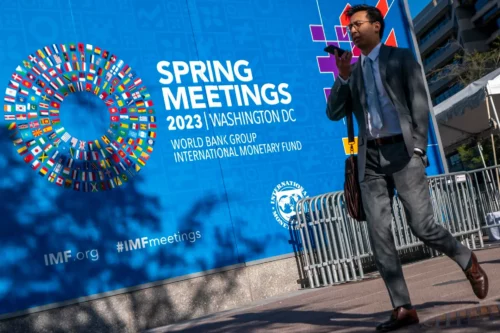
- Approximately 10,000 people including leaders from central banks, finance ministers, civil society, academia, and now crypto, gather this week in Washington, D.C.
- They will discuss “issues of global concern” including the economic outlook, development, and aid effectiveness.
- Crypto is on the agenda and CCI’s Chief Regulatory Officer was invited to speak about the global outlook alongside regulators and the FT.
Where and when do the IMF/World Bank meetings take place?
Twice a year the International Monetary Fund (IMF) and World Bank hold meetings – a Spring Meeting, which takes place in the northern hemisphere’s springtime (typically April), and an Annual Meeting in the autumn, which occurs in September or October. Underlining the parity between the IMF and World Bank with their involvement in these meetings, top billing is alternated between the two organizations.
The first meeting ever to be held was in 1946.
Who is involved in the IMF/World Bank meetings?
At the centre of conversations are the meetings of the joint World Bank-IMF Development Committee and the IMF’s International Monetary and Financial Committee (IMFC), both of which comprise ministers or central bank governors. These discuss the two organization’s levels of progress.
The meetings bring together country officials, central bankers, finance and development ministers, the private sector, members of civil society, journalists, and academics. Observer teams from other institutions like the Organization for Economic Co-operation and Development (OECD) and World Trade Organization (WTO) are also involved. They attend seminars, briefings, and workshops, among other events focused on the economy, international development, and the global financial system.
In the Civil Society Forum policy dialogue sessions are held, which bring together civil society representatives with the organizations’ staff and government officials to discuss issues of concern.
Historically, there was a strong link with the G7, which until the 2007-2008 financial crisis, held its own meeting just before the spring and autumn ones. Since 2009, G20 finance ministers have held a meeting alongside that of the IMF/World Bank’s, while the meetings themselves now typically involve G24 finance ministers.
What’s discussed?
According to the IMF, these meetings offer the only opportunity of this kind to discuss economic policymaking.
Broadly, the world economic outlook, development, poverty eradication and aid effectiveness shape the agenda, which then divides further into myriad issues covered by subject specialists.
Major topics on this Spring Meeting’s agenda include: expanding the institutions’ scope to deal with issues like the climate crisis and its disproportionate effect on lower-income nations, and providing support for Ukraine.
What is crypto’s role?
There is one session across the five day program.
On 12 April, New Economy Forum: The Future of Crypto Assets: Pains, Policies, and Possibilities session will bring together senior leaders to discuss how regulators are paying increased attention to crypto assets and how standard setting bodies are considering regulatory responses. The only crypto industry representative at the Spring Meeting is former regulator Linda Jeng. She is currently the Chief Global Regulatory Officer of CCI. Other panelists include the Deputy Secretary General, FSB, Mr Rupert Thorne, Arif Ismail, Deputy Division Chief in the Payments and Infrastructure Division, IMF, and Jiaying Jiang, Assistant Professor of Law, University of Florida Levin College of Law. Gillian Tett of the Financial Times will moderate.
The session represents an important opportunity to speak directly to senior leaders in government, banking and international aid about the promise of crypto. Approximately 10,000 people attend the meetings, a number that is expected to rise with growing online participation.
What are the meeting outcomes?
At the conclusion of their meetings, the Development Committee and International Monetary and Financial Committee, issue communiques. There are also press conferences, regional briefings produced, and material on the back of various events, including seminars.
Specific to annual meetings are resolutions; the boards of governors decide how best to address international monetary issues and approve appropriate resolutions.

























